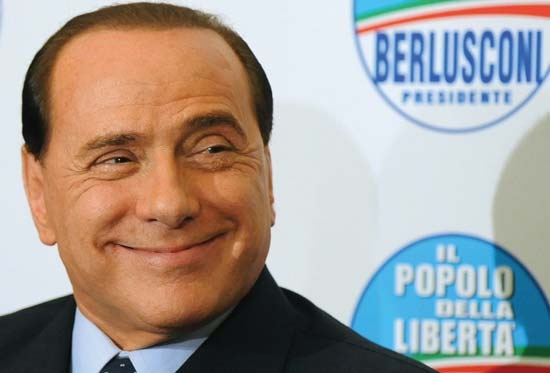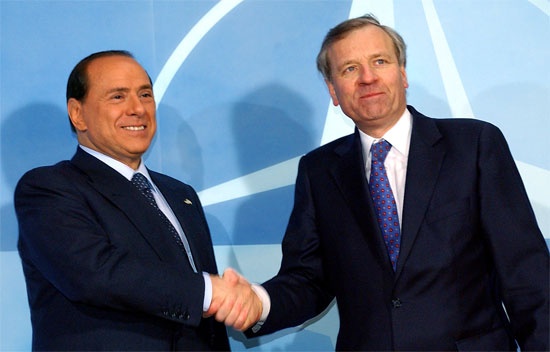Berlusconi, Silvio
Italian media magnate and prime minister
born Sept. 29, 1936, Milan, Italy
 Italian media tycoon who served three times as prime minister of Italy (1994; 2001–06; 2008– ).
Italian media tycoon who served three times as prime minister of Italy (1994; 2001–06; 2008– ).After graduating from the University of Milan with a degree in law, Berlusconi became a real-estate developer, amassing a considerable fortune by the 1970s. He created the cable television firm Telemilano in 1974 and four years later mounted the first direct challenge to the national television monopoly. In 1980 he established Canale 5, Italy's first commercial television network, and by the end of the decade Berlusconi-created stations dominated Italian airwaves. Berlusconi also diversified his business holdings, acquiring department stores, movie theatres, publishing companies, and the AC Milan football team. He consolidated his empire under the umbrella of the Finivest holding company, a vast conglomerate that grew to control more than 150 businesses.
In 1994 Berlusconi founded Forza Italia (“Go, Italy!”), a conservative political party, and was elected prime minister. His tenure proved turbulent. Shortly after he took office in May 1994, officials launched a corruption investigation into his business empire, and disputes within the governing coalition culminated in the Lega Nord (Northern League) party's defection in December. Facing a no-confidence vote, Berlusconi announced his resignation on Dec. 22, 1994, but stayed on in a caretaker capacity until January 1995. He was later convicted of fraud and corruption, but the verdicts were eventually overturned. Despite these charges and criticism of his control of much of the Italian media, he remained the leader of Forza Italia. Promising tax cuts, more jobs, and higher pensions, he led a centre-right coalition to victory in the 2001 national parliamentary elections and again became prime minister.
 Once in office, Berlusconi faced a number of challenges. He supported the U.S.-led invasion of Iraq (Iraq War), and his decision to send troops became increasingly unpopular, especially after an Italian intelligence agent was killed by U.S. forces in 2005 (see Iraq War). Berlusconi also faced criticism as the country's economy continued to struggle. After his coalition fared poorly in regional elections in 2005, Berlusconi resigned and won a vote of confidence in parliament. He subsequently formed a new government. In April 2006 he ran for reelection, but his coalition was defeated by a centre-left bloc headed by Romano Prodi (Prodi, Romano). Berlusconi challenged the results, and an Italian court later upheld Prodi's victory. Berlusconi resigned in May. Less than two years later, however, Prodi stepped down after losing a confidence vote. In the national elections held in April 2008, Berlusconi—at the helm of a new party known as the People of Freedom (Popolo della Libertà; PdL)—won a third term as prime minister. He and his centre-right cabinet took office in May.
Once in office, Berlusconi faced a number of challenges. He supported the U.S.-led invasion of Iraq (Iraq War), and his decision to send troops became increasingly unpopular, especially after an Italian intelligence agent was killed by U.S. forces in 2005 (see Iraq War). Berlusconi also faced criticism as the country's economy continued to struggle. After his coalition fared poorly in regional elections in 2005, Berlusconi resigned and won a vote of confidence in parliament. He subsequently formed a new government. In April 2006 he ran for reelection, but his coalition was defeated by a centre-left bloc headed by Romano Prodi (Prodi, Romano). Berlusconi challenged the results, and an Italian court later upheld Prodi's victory. Berlusconi resigned in May. Less than two years later, however, Prodi stepped down after losing a confidence vote. In the national elections held in April 2008, Berlusconi—at the helm of a new party known as the People of Freedom (Popolo della Libertà; PdL)—won a third term as prime minister. He and his centre-right cabinet took office in May.- Delia Salter Bacon
- Delibes, Léo
- Delibes, Miguel
- delict
- Deligne, Pierre René
- Delilah
- Delille, Jacques
- DeLillo, Don
- delinquency
- deliquescence
- delirium
- Delisle, Guillaume
- Delisle, Joseph-Nicolas
- Delius, Frederick
- Della-cruscan
- Della Falls
- Della May Fox
- della Robbia, Andrea
- della Robbia, Giovanni
- Della Robbia, Luca
- della Scala family
- Della Valle, Federico
- Dell, Floyd
- Dell Inc.
- Dell, Michael